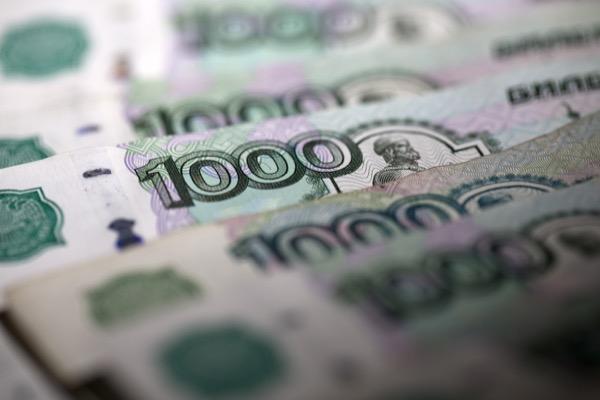
Russia moves towards economic collapse with plunging Rouble
With the slumping Rouble now worth less than one US cent, the Russian economy is on the brink of a collapse.

Karl Marx warns ‘history repeats itself, first as tragedy, second as farce.’ Hitler’s Anschluss with Austria is mirroring Russia’s annexation of Crimea, the encroachment in the Donbas with the occupation of the Sudetenland.
But as Putin assaults Kyiv, Russia is starting to resemble its own ghost of prior economic ruin.
Russian Rouble plunges
On 31 December 1999, Russian President Boris Yeltsin ceded the Presidency to a 46-year-old Vladimir Putin. Yeltsin had burned through the country’s economy in the first Chechen war, despite reminding the US that ‘Russia has a full arsenal of nuclear weapons. He (Clinton) has forgotten about that.’
However, in 1998 Russia was running out of money. The IMF and World Bank lent it $22.6 billion to support financial reforms, and between October 1997 and August 1998, the Russian Central Bank spent $27 billion trying to shore up the Rouble. But on 17 August 1998, the currency became so devalued that Russia defaulted on its debt, causing economic collapse.
Russia’s Putin officially invaded Ukraine on 24 February; like Chechnya, it’s a region he deems unworthy of statehood. And like his predecessor, he has warned the west that interference could result in ‘consequences you have never seen in history.’
But a Molotov cocktail of Ukrainian defence and Western sanctions could see Russia’s economy (USD/RUB) collapse before its President can declare victory.Play VideoPlayMuteLoaded: 7.33%Remaining Time -2:14SharePicture-in-PictureFullscreen
Ukrainian defiance
‘I need ammunition, not a ride.’ The soldiers of Snake Island and Babusya’s sunflower seeds. A destroyed bridge and widespread civilian resistance. Russia’s unprovoked invasion is playing out on 21st-century social media, with every smartphone as valuable as a German Stinger missile.
The result has been a global outpouring of support, exposing the largest miscalculation of Putin’s career. Potential allies have abandoned him. China has said the two are ‘partners,’ not allies and will not interfere with US sanctions. Turkey has decided its EU membership is more valuable than Russian gas and is limiting Russian warships in the Black Sea.
Germany has halted approval for Nord Stream 2 and is increasing its military budget by €100 billion. Canada is placing an import ban on Russian fossil fuels. Finland’s majority wants NATO membership and could bring Sweden in with them. Even Switzerland is breaking its famous neutrality. The EU has shut its airspace to Russia. As the war continues, Ukrainian public opinion shifts ever further towards Europe. And every day, weapons pour into Ukraine, making a swift Russian victory impossible.
Moreover, this drawn-out conflict is a PR nightmare. BP and Shell are selling their Russian oil and gas interests. Netflix is refusing to show Russian state propaganda. Alphabet has stopped monetisation of Russia’s state media, Twitter is labelling it, and Facebook is banning it. UEFA and FIFA have ended their partnerships with Gazprom and suspended all Russian teams. Russian-made vodka is being boycotted. And Putin himself has had his blackbelt revoked by the International Taekwondo Association.
Sanctions
Worse still, the west has cut access to Swift for several major Russian banks and prohibited all dealings with Russia’s central bank. This has left Russia’s $630 billion reserves, stored predominantly in foreign currency, unusable.
In response, Russia has raised its base rate from 9.5% to 20%, barred citizens from transferring money out of Russia, and suspended sales of Russian investments by foreigners. It says this ‘will ensure a rise in deposit rates to levels needed to compensate for the increased depreciation and inflation risks.’ And Kremlin spokesman Dmitry Peskov says ‘these are heavy sanctions, they’re problematic, but Russia has the necessary potential to compensate the damage from these sanctions.’
But fearing a market collapse, Moscow’s exchange remains closed. Charles Stanley’s Will Walker-Arnott believes ‘Russia is increasingly becoming an economic pariah, increasingly isolated from the global financial system.’ Julia Friedlander of the Atlantic Council goes further, saying Russia’s assets have ‘essentially vaporised,’ as ‘these sanctions are hitting hard and went from zero to 60.’
Russia now risks repeating 1998. Regarding USD/RUB, 105 Russian Roubles now purchase one US dollar, up from 75 Roubles a fortnight ago.
The European Central Bank says European subsidiaries of Russia’s largest bank, Sberbank, are failing. Its share price has halved in two weeks. Large queues are forming at the country’s ATMs, as customers attempt to access dollars and euros as some credit cards stop working and withdrawal limits are imposed. Chris Weafer at Micro-Advisory believes ‘this set of sanctions is hitting ordinary Russians to an extent that previous sanctions have not.’
One Russian Rouble is now worth less than one US cent, and less than one Afghani, the currency of a failed state. It’s even worth less than a Robux, a make-believe currency bought with the pocket money of western children.
Steve Hanke at John Hopkins University has calculated Russian inflation is at 69.4%, while Estonian MEP Riho Teras believes the war effort is costing £15 billion every day. And Rabobank analysts predict there could soon be a ‘complete collapse in the Rouble.’
This leaves Russia with a stark choice: Peace, a banking collapse or hyperinflation.